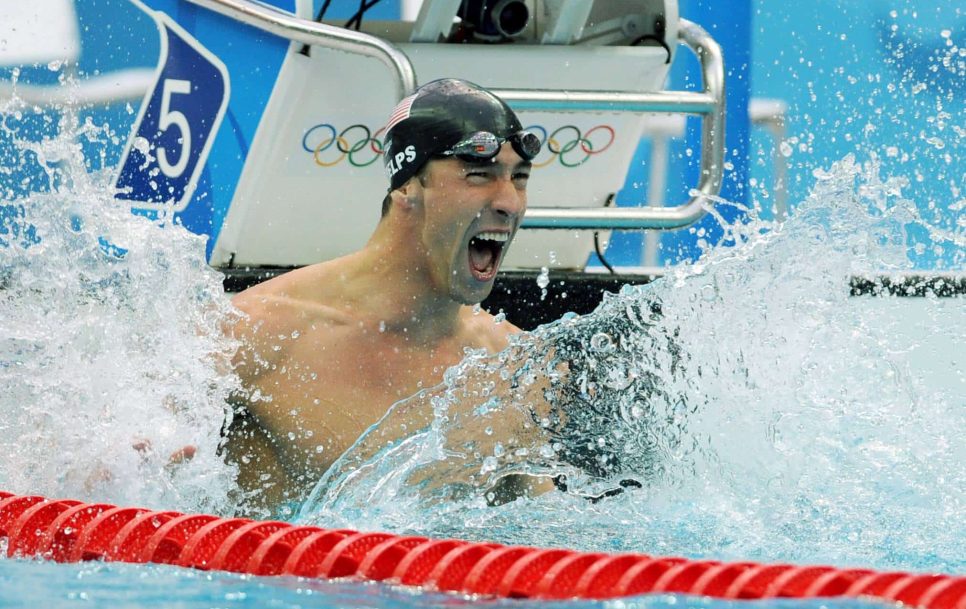Olympic icons: Michael Phelps and his eight gold medals
There is no doubt that Michael Phelps is the greatest and most successful swimmer in history. The American is a 27-time world champion and 23-time Olympic champion who reached the pinnacle of his career 16 years ago in Beijing.
Phelps went to the games in the Chinese capital with a clear goal: to surpass Mark Spitz’s record. The American won seven golds at the 1972 Munich Olympics, setting a world record each time.
Of course, world records also interested Phelps, but his goal was to win one more gold than Spitz. The swimmer, called the Flying Fish, had a mission that seemed anything but impossible. Yes, eight golds would have been unprecedented, but in 2004 in Athens, he had bagged six golds and two bronzes. It would be a small thing to trade those third places for firsts, right?
Phelps showed his power at the USA Olympic team trials a little more than a month before Beijing. He broke two world records and was basically unbeatable.
Mind games did not rattle Phelps
At the Olympics, everything went as it should in Phelps’ first six events. He won one gold after another, repeatedly outclassing his opponents and breaking one world record after another. By the 100m butterfly, Phelps had equaled his gold tally from Athens.
In his seventh event, his biggest competitor was the USA-born Serbian Milorad Čavić. Before the final, the European was full of bravado and said, “It would be good for Phelps if he lost. It would be nice if historians talked about his seven golds and how he lost the eighth to some guy. I would like to be that guy.”
Phelps took Čavić’s words coolly and replied, “When people say things like that, it fires me up more than anything.”
Čavić was not the first to try to break Phelps with mind games. Before the 4 x 100m freestyle relay, French legend Alain Bernard had spoken similarly, and the American again responded with stoic calm, saying it just added to his motivation. When the final was over, Phelps enjoyed the gold, but the French anchorman Bernard had to settle for silver.
The 100m butterfly final was one of the most thrilling in Olympic history. Phelps and Čavić were neck and neck; in the end, the American won by just 0.01 seconds. Even though Čavić pushed him all the way, Phelps did not set a world record. However, he took the Olympic record to 50.58, which stood for eight years until Singapore’s Joseph Schooling beat it.
Since Čavić’s loss was extremely close, Serbia filed a protest. The International Swimming Federation (FINA) examined and scrutinized the swim from every angle until they confirmed Phelps’ triumph. Čavić accepted this and later wrote in his blog, “There’s nothing wrong with losing to the greatest swimmer there has ever been.”
By defeating the European, Phelps tied Spitz’s record. He also became the third athlete in Olympic history to win five individual golds at a single Games. The American joined speed skater Eric Heiden (1980 Lake Placid) and gymnast Vitaly Scherbo (1992 Barcelona).
Records are meant to be broken
The next day, Phelps went on to make history. In the 4 x 100m medley relay, he triumphed with Brendan Hansen, Aaron Peirsol, and Jason Lezak. The legend swam the third leg, moving the USA from third to first by half a second. The Americans set yet another world record, and more importantly, Phelps now had eight golds from Beijing, one more than Spitz had in Munich.
Incidentally, Phelps’ eighth gold was witnessed from the stands by his great idol and former fierce competitor, Ian Thorpe, who is considered one of the best freestyle swimmers of all time and has 13 world titles and five Olympic golds in his trophy cabinet.
Before Beijing, Thorpe considered it highly unlikely that Phelps would win eight golds. Phelps was not deterred by this, sticking the Australian’s words on his locker and drawing motivation from them.
After the relay, Thorpe congratulated Phelps’ mother and the history-maker himself. “I am really proud of him,” said the former swimmer. “Not just because he won eight golds. Rather, it’s how much he has matured into a great human. Never in my life have I been so happy to have been proved wrong.”
Instead of boasting about his eight golds, Phelps wisely summarized his feat: “Records are meant to be broken. Anyone can do anything if they set their mind to it.”
Such an impressive Olympics caused doubts among skeptics. There was talk that eight golds were too good to be true. Similarly, there were speculations that Phelps used doping, but he was clean before, during, and after Beijing.
Although what he did in Beijing was impressive, Phelps perhaps deserves the most praise for staying at the top for so long. His career had some breaks, and after the 2012 London Olympics, he fell into depression and contemplated suicide, but the American overcame all obstacles thrown in his path.
His first major medal came at the 2001 World Championships, and his last 15 years later at the Rio Olympics. His triumphs and world records marked almost all the seasons in between.







